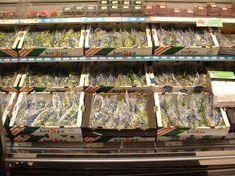
Grapes are a strong performer in Asda’s fruit portfolio and fruit buyer Lee Harper saysthe retailer plans to develop it into the future.
“Our grapes are performing very strongly, we’re seeing positive year-on-year growth and we’re planning to take it even further next year,” he says.
Asda’s main aim on grapes is to widen its range and bring its own brands into the sector. Harper says: “We need to get more SKUs into grapes to give our customers a greater choice. That means we want to get things like Smart Price in there.
“We want to get our brand hierarchy, of good, better and best, through all products and a key area for us is on grapes.”
At the moment the retailer has a standard offer on grapes, featuring six SKUs, loose green, loose red, mixed, seeded, organic and a snack pack, which Harper says is still under a degree of development. “We’re still working on that offer. We trialled a snack-pack earlier in the year, but we want to develop it further - it’s essentially offering consumers a smaller snack-sized pack within the grape category.”
He says Asda is looking at developing it in a bag format but still needs to get a few things sorted out before it can go ahead.
The main focus of Harper’s attention at the moment is optimising the performance of core activity: “At the moment, we’re really just concentrating on getting the day-to-day side of things right,” he says.
“We’re not really looking to bring in new varieties, we want our customers to be satisfied with our current range before we start looking to bring anything new in.”
He says it had been a good year for grape quality: “We’ve worked very hard on our sourcing base and have got a strong relationship with growers which means we are always getting the best possible quality supplies.”
Unlike some retailers, Asda has maintained a supply of seeded grapes, and Harper says he does not see that changing in the short term. “I think seeded will remain there because it gives consumers choice, and we certainly don’t want to take that away from our customers.
“I can’t see it fading away, certainly not for a good few years, seeded grape is still a very viable product.”
Within the Asda portfolio, green seedless is most popular variety followed by red, then seeded and finally mixed.
Harper says consumer tastes have remained fairly static on grapes, although Asda is beginning to see increasing demand for red grapes.
Asda has been using zip-lock bags on its grapes for some time now and Harper claims it was the first retailer to introduce the concept to the UK market: “We’re working on them at the moment to ensure the bags are strong and the zips don’t break. They’ve helped to take a lot of cost out of the business as well, as the zip-lock bags can be packed at source.”
In terms of space instore, he thinks the category is pitched about right. “I think grapes have got enough shelf space, and that’s why we’re trying to bring our brands into the category.
“We need to get away from simply having shelves full of loose green and loose red grapes. We want to bring in more choice and hopefully we’ll be able to do that next year.
“One of my key challenges is to close the gap on choice and develop our sourcing further to make sure that the choice, and our quality, is right for our customers.”
Meanwhile, Asda’s grape supplier International Produce (IP) is working hard to deliver real benefits through to the retailer’s shelves.
Jamie Rungay, category manager for grapes, says they are using the consolidated volume that the Asda order gives it to drive real, positive change.
“We want to become more important to our growers so that they become more important to us.”
He says IP is were working on ensuring the supply base is consolidated to deliver maximum efficiency and the best quality. “We’re working hard on getting a 52-week offer on Crimson Seedless.
“We have a strong supply base on grapes and we’re working hard to make sure the mass of our order is going into the right places.
“We’re looking to work long term with growers and develop a long-term position in the market. We know where we’re going to be in three and four years time and can plan accordingly.”
He says IP is looking for team players who are also in for the long haul, and not just a quick profit.
“We don’t want to have a competing supply base, but a colleague supply base. We see the supply year as one big relay race and how the suppliers hand over that baton is very important.”
Team work is vital within suppliers, Rungay says: “There will be a grower in South Africa looking for a solution that a grower in Egypt has already found. It’s all about being one team and sharing that information and knowledge.”



